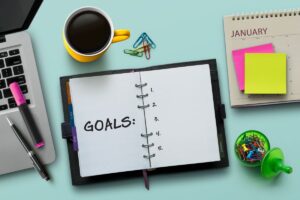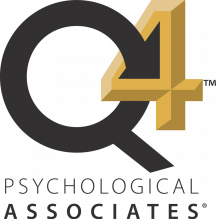Developing Resiliency in the Pandemic Workplace
These days, people talk a lot about resiliency – how to recognize it, how to develop it, and why it matters in today’s workplace. And it makes sense. Between a global pandemic, an economic recession, and widespread civil unrest, our collective ability to endure and bounce back has been tested, unlike anything most of us have ever seen before.
In a webinar presented with FOCUS St. Louis, Psychological Associates consultants David Rowan, Ph.D., and Cheryl Throgmorton, Ed.D. talked about what resilience looks like in 2020, and how leaders can help foster and develop it in themselves and others. And, given a brief issue with their Internet connection about 20 minutes in, they even had to demonstrate a little resiliency of their own. Sometimes, experience is the best teacher.
This conversation was filmed in April of 2020 – so while the references to toilet paper shortages are (thankfully) a little outdated, the core message and key advice are still as relevant as ever.
For those of you who prefer reading, we’ve provided a lightly edited transcript of the webinar below.
The Power of Resiliency – Why We Need it and How We Develop It
Cheryl Throgmorton: Thank you, Matthew and Focus St. Louis. We are so grateful for this opportunity to partner with you and to learn with everyone on this webinar this morning.
What we’re going to cover is “what is resiliency.” And we are going to discuss how to develop it for ourselves and then how to build it in others. David and I are going to leave you with one practice that you can implement from here for each, building ourselves and building others.
What is Resiliency?
Cheryl: In its simplest definition, resiliency is the ability to bounce back from stress. Resiliency centers around two main concepts—facing adversity and adapting effectively. On any average day, resiliency is going to be a good, even a great quality to have. But researchers emphasize that in times of crisis, it’s especially critical. I don’t think anyone would argue that it is especially important right now as we face all the challenges of the Coronavirus on ourselves, our families, our teams, our organizations, our communities and quite honestly, the globe. There is also a wealth of research that suggests that when we are more resilient, we’re going to have higher levels of well-being, higher levels of hope, satisfaction, organizational commitment and even job performance.
David Rowan: And I would weigh in and just say my favorite quote, Cheryl—and you probably remember this from our fun conversations about preparing—is the Michelle Obama, quote, “Grief and resilience live together.” I just feel that that is such a simple and true statement.
Cheryl: Before the David and I dive into more of the content, we definitely want to get a sense for where is everyone at right now. How would you rate your current level of resiliency?
And as you are weighing in, I’ll just share an example. I have been at every level of this spectrum in the course of one week. I had a recent significant loss, one of my good friends passed away and my resiliency was really low.
It’s been medium through a lot of this. I haven’t been feeling my best. I’ve been coughing. I think it’s from seasonal allergies, but it’s also been high, engaging with David and my colleagues at Psychological Associates to create things like this have really helped give new meaning to my work. So I think it’s an example that we can be on any spectrum at any given moment.
David: For me, today my resilience feels strong. But I know that there have been days where it hasn’t. And so I think, like you, I’ve felt the spectrum. And it’s interesting to watch myself go up and down and work on my own resilience every day.
Cheryl: Absolutely. It looks like our group is pretty medium to high. And I’m glad that you all think that resiliency something that we can develop. And David, I’m going to invite you to tackle that whole response and to go on to this notion of, is it nature or nurture?
Resiliency: Nature vs. Nurture
David: Resiliency is a subject that psychologists have studied for a number of years and developed ways of assessing. And through those assessments we’ve discovered—and this won’t be a surprise to this audience—that it certainly includes things that are both sort of natural to us, and it includes things that we learn along the way. And it’s similar, you can think of it like physical attributes. You know, some of us may be born with more natural skills, with balance or athleticism. But all of us can decide, “hey, if I want to get stronger, if I want to run faster, I can go to the gym and make it a habit and I can build my physical skillfulness.” The same is true of resilience.
Once you learn about the different elements and aspects of resilience, you can consciously choose to build your skills in those areas. So while one skill may come more naturally to you, and you can emphasize that and focus your time and energy in that area, another skill may not come as naturally to you, and so you might choose to spend more time trying to build that skill up. It’s important to know that we as individuals can learn and develop our resiliency skills for ourselves. As leaders, we need to know that we can build the resilience of others around us. And then it’s important to know as leaders that our organizations can become more resilient and we can have an impact that goes beyond our own team in building the resilience of our organizations.
Developing Personal Resiliency
David: Let’s talk a little bit about elements of our own resilience. If you want to get stronger or faster, you go to the gym and you lift weights or you go for a run. You make it a habit. What things have you already been doing in your life, knowing where your resilience strength may be or where you may want to build up more strength? What habits have you already been doing to practice your own resiliency and build your own resilience?
You probably all noticed in your LinkedIn and your Facebook that folks have been talking about the topic of resiliency quite a bit lately. And we often see things like, “make sure you get good sleep, make sure you get good exercise, take care of your body.” Those kinds of things certainly help you become more resilient. But we wanted to dig deeper and share some things that we haven’t seen as much out there in the literature and in Facebook feeds and whatnot.
Cognitive Reappraisal
David: So let’s talk about the core resiliency skills. These are terms from psychology. We will define them as we go and give some examples. So let’s start with cognitive reappraisal. Said simply, this means using balanced thinking. I’m sure all of us have had moments during the course of this life changing, world changing event where our thoughts have gone to extremes. We may have thought, “oh my gosh, how am I going to handle Covid-19 and how it’s impacting my business and my family?” And our minds may have strayed to some extreme thinking. And in those moments, we may not have felt particularly resilient. But by using cognitive reappraisal or
re-balancing, you can bring yourself back to a middle ground and remind yourself that, while it’s a significant event and certainly is changing things, maybe it’s not quite as extreme as you originally thought and you can find that balance.
Emotion Regulation
David: The next skill is emotion regulation. This is a term psychologists use for how you can experience your emotions without being overcome or overwhelmed by them. Some of you may have heard a psychologist say, “feel the feeling, but choose the behavior.” That’s a simple saying that I actually use regularly with myself. All of us have had the experience of feeling emotionally overwhelmed, whether it was overwhelmed with worry and not sleeping well or your mind racing over thoughts of how this is changing my business.
We may get caught up in those emotions and we may not be operating or performing in an optimal way. And so part of building your resilience is your own capacity to feel concern, worry, anxiety, to take those deep breaths and then to help yourself choose your behaviors actively, rather than being reactive or overwhelmed by your behaviors. I’ll just mention that we do have some free webinars on emotional intelligence, which is a complementary skill that some folks may want to learn about and utilize in cognitive reappraisal and emotion regulation are both part of leveraging and using your emotional intelligence to be more resilient.
Active Coping
David: The next skill we want to mention is active coping. Active coping is about stress management rather than avoiding things or putting them off or not confronting difficult challenges. It’s about saying, “you know what, I’m going to face into these tough times.” And so you might think, gosh, instead of not looking at my email because I’m afraid of being overwhelmed by how many are coming in, or not calling that important client and seeing how are they, because you’re worried what they might say, or not reaching out to that direct report or that colleague who maybe was a little down in the dumps because you don’t know if you want to get into a long conversation with them.
Active coping means looking at the problem, breaking it down, realizing that you can take it on, developing a plan for yourself and then taking some actions to face into it. And finally—and this is what we actually want to spend a little bit more time on and talk about how you can build your tool kit—and that is self-efficacy.
Self-Efficacy
David: Self-efficacy means believing we are effective in the world, that we have the ability to do things, to change the environment around us and to positively influence how things are going. It’s positively influencing the material world. It’s also influencing the people we interact with every day. Those who have the ability to use cognitive appraisal, emotion regulation, active coping, and self-efficacy, are folks who have strong resilience skills and tend to be able to bounce back. So these are the kinds of skills we want to build in ourselves, coach and others and grow in our business.
Right now with Covid-19, we certainly can’t just make it go away. Sometimes we may start to get down in the dumps and think there’s not much we can do about it. But through building these skills, and particularly with self efficacy, we can remember and remind ourselves that we can have a positive impact. I know one thing that’s been heartening for me, and I’ll be curious to hear, Cheryl, if you have thoughts on this, and that is, I’ve looked at Facebook and I’ve looked at LinkedIn and I’ve seen images of musicians going out onto the balcony and playing music for their neighbors in Spain. Those musicians could have stayed inside and said, well, I’m just a musician. The only people who are needed right now are doctors and nurses and medical professionals. I’ll just stay inside. But that’s not what the musicians did. They said, I’ve got a gift to give the world. It can have a positive impact. And it’s through those actions that we can feel more empowered and feel more resilient and buoy the spirits of others.
Cheryl: As David gets ready to share a series of questions that you can use to really reflect on your self-efficacy, we encourage you to continue doing the things that are working, you know, listening to the relaxing music, getting a good night’s sleep, gratitude, prayer, if that’s your practice. And again, this could be something like, I’m really struggling and I want to appreciate that this this could be, as Amanda responded, a good first step. And we hope that what we provide you today will give you a way to reflect and some practices that you can use to build your resiliency.
David: We all have had good days. We’ve all had rough days. We’ve even had days where things started the rough and they got better.
Filling Your Self-Efficacy Backpack
David: You all may be familiar with a video that went around a few years ago. It was a commencement speech from a military leader, Admiral William H. McRaven. He talked about a habit he got into early in his life and his military career that helped him feel a sense of self efficacy. And it’s really simple. He said, start your day every day by making your bed. You may think, well, that’s silly. How can how can the road to success and resilience be built on making my bed every morning? What does it matter if my bed’s a little bit messy? But the way he described it, it was it’s one thing you can do to show yourself that you have efficacy in the world, that you can do things to make your life and your space better.
And so what we want to do is we want to talk about other skills you can use to fill your self-efficacy backpack. We’ve heard that Covid-19 is going to be a long haul. We all need to be ready to be resilient for quite some time. So we’ve got some questions we want you to reflect on, and think about what could you put in your self-efficacy backpack?
It starts with your core values. No matter what challenge you’re going through, no matter what difficult situation, you always have your values. They guide your decisions and maybe that got you into the profession that you’re in, or the missions that you want to accomplish with your business or your organization, the ways you give back to everyone around you. So you can start by writing down a list of your core values and letting yourself know what base you stand on. Where is your firm ground?
Check in and see what motivates me, what do I get excited about, how can I be enthusiastic again? Where does my enthusiasm come from? So what motivates you is a great question to ask so that you know how to get re energized.
All of us have knowledge, skills and abilities. In doing something for others, we build our sense of efficacy, and our sense of resilience, and our sense of value, which is so important right now. We all want to feel like we’re adding value and doing more for others.
We’ve all been through a hard time, though maybe nothing like this. I’ve never been anything through anything like Covid-19 before. But I’ve been through some tough times personally and professionally, and I know how I got through it. Think back to those moments that were tough for you. Who did you talk to? Who did you lean on? What habits did you use to pick yourself up? Did you go for a run? Did you get some exercise? Did you, as Cheryl said, pray for a moment or reflect on something that inspires you? Who can you support?
Helping Yourself By Helping Others
David: One thing that’s so true for adults is we need meaningful work. We need to contribute to our communities and we need to know that we’re doing something for others. It may seem simple. It may just be people inside your house who you’re trapped up there with. It may be your neighbors. It may be that one co-worker who’s been a little quiet you can reach out to. It may be that that customer or colleague you haven’t spoken to in a while. There’s got to be someone in your world who you can support or you can give a meaningful contribution to.
Cheryl: Uh oh, we’ve lost David. Well, let’s continue. Some of the further questions are, Who needs my talents and my gifts? What material resources do I have? And it’s important to note that we all have different levels of resources. And again, we can ask, “What can we do? What can we create?”
What are some of the things that you do for others that you’re doing for your family, for your co-workers, for your organizations? We want our audience to weigh in on that. What are some of the things that you are doing to build resiliency in yourself and others?
I love these responses. “Reach out and listen is going to be a critical thing to do.” “Thinking of you” notes, words of encouragement, taking time to play.” I love that. There’s a lot of great things that you guys are doing. And we encourage you to continue to do some of those things. Just fostering an environment where there is social support that you are engaging in, you are encouraging connections. We believe that this can happen even in a remote setting.
Developing Resiliency in Teams and Organizations
Cheryl: I’m glad you guys are doing video calls and video conferencing, building on trust and enabling cooperation, being optimistic and positive, encouraging joy and laughter. Leaders in organizations can promote resiliency within their teams by promoting mindfulness, gratitude. You could give that that series of questions that David just covered to your coworkers and reflect on them as a team. We encourage you to continue to give the encouragement, to do the “thinking of you” cards and things like that.
I also want to spend some time just commenting on the importance of laughter and joy. Finding those joyful moments in the face of adversity is critical. There is a great example similar to what David talked about with the musicians on the balconies. There is a group of nurses from Mercy Springfield Hospital who were doing the TikTok dances and it actually went viral. By encouraging that group of nurses to dance, it provided stress relief, resiliency building not only for them, but for everyone who viewed it.
It’s important to note that expressions of joy and inspiration come in a lot of different forms. Not everyone is expected to be a cheerleader, but leaders need to maintain an attitude of optimism. Almost always, there is good that comes from crisis. An example is what’s going on in health care. You know, the fact that so many people are hand-sewing masks. What could have just been a couple of people has really become a movement and everyone’s getting involved. Some of you who are on this call may know that I spent 19 years working at three great health systems prior to joining Psychological Associates. Health care workers were already stressed out before facing this this crisis.
And you’d think, oh, facing this crisis, they’re going to break. But no, we’ve seen the opposite. This crisis gives us the opportunity, the time to pause and reflect and to really show our esteem and our gratitude for what they do. It gives them a chance to really reflect on why they got in health care in the first place. What are my values, what’s important to me, like we mentioned earlier. So, it gives us a chance to really boost our resiliency by boosting others.
And before we go over our recommended practice for boosting resiliency in others, I think it’s important to note that when it comes to developing resiliency within a team or an organization, it’s important to meet every individual where he or she is.
We all have different levels of resources. We’re all likely in different places. Different things are causing stress for us and we need different supports to navigate the stress and the change. Change happens one person at a time. Everyone’s experience with what’s going on is going to be different. So even though we might be doing a team-wide effort or an organization-wide effort, it really requires attention to the individual needs and differences. At PA, we like to say we need to know how to help different people differently. It’s really a message to be inclusive in our practices and to do what they need, not what we think they need.
Practicing Resiliency in Everyday Life
David: Cheryl, I want to just sort of highlight that, underline it and put an exclamation point next to it. I’m practicing resilience right now. I’m sorry that my WiFi dropped out. I did everything I could in advance to try and make sure it wouldn’t. I worked on my bandwidth, turned everything else off in the house. But of course, things happen, things that we cannot control. And so I’ll just share with you guys. When my WiFi went out, I had a momentary panic. I thought, oh, no! But you know what I did? I went into problem solving mode. And you know what I’m doing right now, even as I’m talking to you, I’m talking to myself and I’m talking myself through it. You know, I’m saying, hey, hey, David, it’s OK. You know, it’s all right. You’re back. Everybody’s fine. You know, it was just a little lost WiFi for a couple of minutes. It’s not the end of the world. So you could probably see I’m blushing a little because I’m a little embarrassed. But you know what? I’m sure everyone’s had moments like this, right? We’ve been on one hundred Zoom meetings. We’ve had phone calls that dropped or our cat stepped on the keyboard and turned our meeting off. So I just want to encourage everyone to kind of think in those terms.
All of us have had that moment where things didn’t go as planned. from big to minor.
And we all have that capacity for resilience. And so I’ve been watching the chats and seeing all this stuff folks are doing. Everything from sewing masks, to Zooming and Skyping with old friends, to checking in on neighbors. There’s so many so many great things that folks are doing.
Cheryl: David, I was amazed at how quickly you got back on. Thank you for your resiliency.
And again, like you, it sounds like there are fun things that everyone one is doing. We want you to continue to do those things. And again, David and I also want to challenge you to be purposeful and we want you to give meaningful recognition.
Building Resiliency Through Meaningful Recognition
Cheryl: Let’s go back to the idea of filling our backpacks. Sometimes, there might be a supply in our backpack that we want to share with someone else. This tool for increasing resiliency is a way to really refine the feedback process. And again, this really comes from research done by P.A. with a group of critical care nurses. But I think we can all agree that it would apply to any industry, any level of coworker. And it’s a matter of being really purposeful with our feedback to give really meaningful recognition to say what our coworker did, how it made a difference. And importantly to the point that David and I were stressing, it needs to be individualized. It needs to be given in a way that’s going to be well received by the receiver.
Meaningful recognition is a practice that really is well-rooted within our Q4 leadership. That is the core of our material at Psychological Associates. The practice focuses on the leaders’ awareness of others’ behavior as well as their own, and that speaks to that emotional intelligence that David mentioned earlier. And it’s about the ability to size up and determine what’s meaningful to the people we are giving the recognition to. This is backed by a lot of research. And again, while the purpose of demonstrating meaningful recognition is to recognize your coworker, colleague, or even your boss, the benefits can extend much further. When we recognize people in a meaningful way, it shifts our focus from the bad things that are going on and helps us realize that there are a lot of great things happening all around us. And there’s a lot to celebrate every day, and perhaps especially in this time of crisis.
David: Absolutely, Cheryl. And if I could tag on to what you just said and loop it back around to where we started, we talked at the beginning about is resiliency, is it nature or is it nurture? Are you born with that or can you learn it and can it grow? And of course, there’s all kinds of studies that show that that resilience can be grown. And those of you who are educators have probably read about grit. That was a theme in education for a number of years recently and about how to help kids in the classroom show more grit and determination. Stick-to-it-ness. And they talked about how do you talk to kids? And one thing you do is instead of focusing on maybe some nature elements like, gosh, you’re smart or boy, you’re just so clever, you’re always going to get the right answer. Instead, you give feedback to kids about what their behavior is, because behavior is something we can all do something about. It’s something we can control and where we can show efficacy.
And so this exact script, what they did, how it impacted the world, what their efficacy was, and how it had a meaningful impact to you or those around you — that’s that nurture element of building resiliency. In watching out for it and noticing it, you’re building your own muscle of noticing where resiliency is happening around you, where self efficacy is happening around you. You’re building grit in people. You’re being a great example of that whole package of behaviors from self resilience to coaching resilience to organizational resilience.
Cheryl: We do want to do a final poll. David and I are curious. Of these two practices, which one are you going to implement first? Are you going to fill your resiliency backpack, or are you going to practice meaningful recognition? Hopefully you’ll do both.
David: Well, Cheryl, while we’re waiting for the responses I’ll share what I’m going to do, and that is that I’m going to work on practicing meaningful recognition of others. I know that at Psychological Associates, we are moving at light speed. Of course, business always moves fast. And we had been busy before all this happened. But we’re busy in a new way, in a different way now. And I’ve seen emails coming in from co-workers at late hours of the night and early hours of the morning. And everyone around me is pulling together as a team to accomplish our mission, to help others, help others be great at work, be great leaders, and contribute to the community. And it’s really impressive to see some things that my colleagues are doing. So that’s what I’m going to do. I’m going to work on meaningful recognition.
Cheryl: Fantastic. It looks like the poll is like split almost 50/50. I think I predicted that there would be a little more practicing outwardly focused than inwardly focused, but it’s pretty much 50/50.
As we draw to a close, let’s end on this quote by Elizabeth Edwards:
“Resilience is accepting your new reality, even if it’s less good than the one you had before. You can fight it, you can do nothing but scream about what you’ve lost, or you can accept that and try to put together something that’s good.”
I think that given the challenges we are facing, it really speaks to how we can all show up. Even in the midst of crisis, there are almost always good things, silver linings. We know from both anecdotes and research that facing adversity can have positive outcomes.
We really hope that this that this session has given your resiliency a boost and that you’ll utilize it to really reach out to your coworkers, your teams, and your families to boost their resiliency as well.
Thank you.
Ready to take your newfound resiliency knowledge and put it into action? Download our Self-Efficacy Resource and start filling your resiliency backpack.












